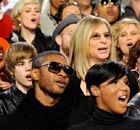Foreign and Military Affairs
China dismisses US criticism on trade, exchange rate
(Xinhua)
Updated: 2010-02-04 22:31
 |
Large Medium Small |
BEIJING: China on Thursday dismissed the latest US criticism on its trade surplus, saying its currency exchange rate is close to a reasonable level.
"We expect the United States to take a rational view of bilateral trade issues and to adhere to equality in negotiation. Accusations and pressure will not bring solutions," Foreign Ministry spokesman Ma Zhaoxu said at a regular briefing.
Ma's comments came a day after US President Barack Obama said his administration will "get much tougher about enforcement"of trade rules in its dealing with China. Obama said his administration will put "constant pressure on China" to liberalize its capital account and appreciate the currency.
"Our currency, the RMB, has appreciated more than 20 percent against the US dollar since July 2005, when China moved to a floating exchange rate regime," Ma said. Before 2005, the RMB was pegged to the US dollar at a fixed rate.
"The RMB exchange rate has drawn close to a reasonable and balanced level, given the international balance of payments and the market supply and demand for foreign exchange," Ma said.
"China has never attempted to seek a trade surplus," Ma said, adding that China-US trade cooperation is mutually beneficial.
Sancion on US arms firms "reasonable"
In response to questions regarding Washington's latest arms sales to Taiwan, Ma said China's decision to impose sanctions on US arms firms is reasonable and reflected China's stance.
China has repeatedly opposed the nearly $6.4 billion arms sale program to Taiwan. It decided to suspend military programs and security talks with the United States in response to the Pentagon's announcement last Friday it would sell an arms package including Patriot missiles, Black Hawk helicopters and minesweepers to Taiwan.
"Some US companies are involved in the arms sale, and China will definitely put sanctions on them," Ma said, without specifying the possible punishment.
The potential targets of the sanctions include US defense contractors Boeing, Sikorsky, Lockheed Martin and Raytheon.
Asked whether China-US tension peaked over the arms sale and Obama's possible future meeting with the Dalai Lama, Ma said the United States should "take China's stance seriously and work with China on common goals."
For the past two days, Ma has warned the US leader against meeting the Dalai Lama in any way.
"I want to reaffirm that sound China-US relationship requires both nations' joint efforts. The key is respecting each other's core interests and concerns," Ma said.
Ma called on the United States to abide by the principles of the three joint communiques and the recent agreement reached by the two presidents to safeguard the overall bilateral relationship.











